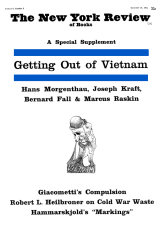Drawing historical analogies is like eating soup with a knife—messy to begin with and in the end futile. Still, certain stable and enduring elements recur in every political situation, and one way to discover the nature of the present is to study these elements. It is interesting, in a speculative and tentative spirit, to imagine the conditions of an American Dienbienphu.
However, far from being discreetly conjectural, all the comment on this subject that I have seen so far seems to me crude and mechanical. It supposes that the disaster would take place on the ground and in the future, when it is realistic to think of it as going on not in the future, but now; and not on the ground, but in the air. To be specific, and at the risk of seeming paradoxical, the most likely candidate for the American Dienbienphu is the bombing campaign against North Vietnam.
To grasp this point, it is first necessary to understand the reasons that caused the French to expose themselves in that fatal valley in May 1954. There were three motives. First, the French wanted to fight, not the hit-and-run guerrilla war so dear to the Communist enemy, but a real battle with planes, heavy fire-power, and big units. Secondly, the French felt that by showing their stuff in such an engagement, they could give a psychological lift to the friendly but beseiged Royal Laotian government, which had been nearly unseated by the Vietnamese in a lightning assault in the spring of 1954. Finally, the French felt that if they could win such a battle, they could bring the other side to the conference table under favorable terms.
It is not coincidence that precisely the same three motives underlie the American bombing campaign in the North. The advocates of the bombing campaign who finally won their point last February repeatedly declared that “We can’t win the war playing by the enemy rules. We have to make the enemy play by our rules.” Both at the time the bombing began in February and subsequently, members of the Administration have indicated publicly and privately that the bombing provided a psychological lift to the Saigon government by demonstrating that they could hit back against the aggressor in the North. Lastly, the Administration has often reiterated the theory that with its cities and factories in danger, Hanoi would finally be forced to come to the conference table. Indeed General Maxwell Taylor has referred to the cities and industry of North Vietnam as “hostages.”
The next step in the analogy is to understand not why the French failed at Dienbienphu—but why they could not possibly succeed. The main reason, of course, is that there was no graceful way to get out. Once committed to the Dienbienphu strategy, the French had to stick with it. To back down would have involved a public psychological defeat of sweeping proportions, bound to work to the advantage of the enemy.
Moreover, even a military victory could not have achieved very much. The Vietminh would have suffered heavy losses, as in fact they did. They might have been obliged to reduce, or slow down, their activities over a long period of time. But there is no reason to believe they would have given up. On the contrary, the Vietminh was so deeply implanted in so much of the country that there is every reason to think that they would have continued to fight on. Militarily, as it happened, the victory at Dienbienphu was, for the Vietminh, only an anti-climax.
Quite similar considerations, it seems to me, are now becoming relevant to the American bombing of North Vietnam. As the bombing goes on, it becomes increasingly difficult for this country to cut it off; even a pause looks, to the enemy, to the government in Saigon, to parts of the political opposition in this country, and to the proponents of enlarging the war inside the Administration, like a show of weakness. And the last thing a President want to do in this kind of situation is to seem to show weakness.
But to win the bombing campaign—that is, to carry out the destruction of Hanoi and Haiphong and the North Vietnamese industrial sites—would win nothing. For the presence of the threat to these targets constitutes the only pressure America can apply to bring Hanoi to the conference table. Once the targets have been wiped out, there will be no further pressures to exert in order to bring about negotiations: at that point, the “hostages” will have been killed.
Perhaps it is possible for the United States to measure its military and political effort so well that none of these dangers will materalize. To do so, however, is to cut things awfully fine. Finer, indeed, than the crude bureaucratic machinery of the American system usually permits. In my view, accordingly, it would be sensible to develop patterns for suspension or abatement in the bombing that would not attract attention, that would keep the other side in doubt as to American intentions, and that would leave the door open for the President to vary the pressure at will.
Advertisement
This Issue
September 16, 1965



